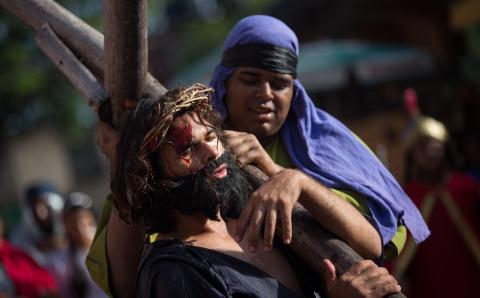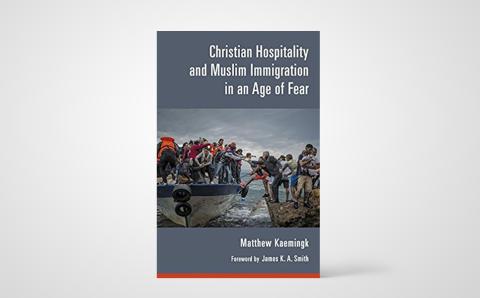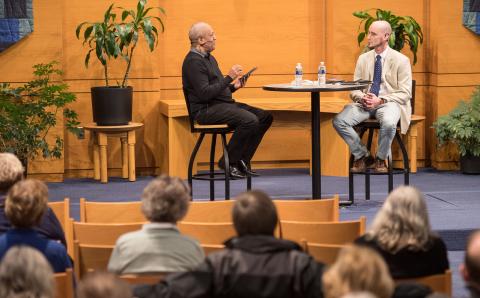Black History
Regarding “Making Black History in the Christian Reformed Church,” Feb. 2018): The Cleveland and Akron churches will always remember the ministry of Rev. Emmitt A. Harrison, who served this area in the late 1990s until 2010 or thereabouts. Please include him as an African American to be honored in Black History Month.
Fred and Sandra Wybenga, Tallmadge, Ohio
Reggie Smith’s article “Making Black History in the Christian Reformed Church” is an engaging read and long overdue. I regret, however, that he does not mention Rev. Clarence Presley, pastor of Word of Truth Ministries in Seattle. Pastor Clarence’s personality, vision, and masterful preaching have influenced many. His sports ministry has influenced the whole city.
Harry Weidenaar, online comment
What a great article on African Americans making history in the Christian Reformed Church (“Making Black History in the Christian Reformed Church”). The article would have hit home a little stronger if the pictures of the individuals were identified with their names.
Andrew Ottevangers, Surrey, B.C.
Editor’s note: The names of the eight individuals pictured on the cover and with the article were identified in the Table of Contents of that issue.
Double Dipping
In the communities I have served, funeral directors usually recommend that the pastor be given an honorarium and sometimes suggest a range (“Big Questions,” Feb. 2018). Caring for grieving loved ones and preparing for an excellent funeral can be very time consuming. Compared to the thousands of dollars a family will spend on funeral arrangements, a modest gift to the pastor can be a fitting way for the family to thank him or her. I have always enjoyed receiving gifts; I trust many grateful mourners also received some joy in their giving. Over the years, the symbolic value of these honoraria has meant more to me than the actual amounts.
If the pastor were charging a fee, I would agree with your word choice of “double dipping.” But I believe I am speaking for most of my colleagues when I say that we do not charge mourners, but we do gratefully accept the gifts offered by thankful families.
Bryce Mensink, Terra Ceia, N.C.
I agree that a pastor should not be “requesting” payment to perform funeral or wedding services (“Big Questions, Feb. 2018). But as a pastor I want parishioners to understand two things: One, pastors usually spend a lot of additional time and heart on these responsibilities; meanwhile, our other responsibilities do not go away because of an upcoming wedding or funeral. Two, the modest honorarium we often receive (in the range of $100-$200) for performing these services is often used by pastors to invest in quality time with spouses/families. Honoraria are not about “feeding on” the flock; they are a demonstration of gratitude for the pastor’s additional time and investment in the pastor’s family. If there is financial hardship, please don’t pay the pastor anything.
Nicholas Van Beek, Lansing, Ill.
In answer to the question of paying pastors for the funeral service (“Big Questions,” Feb. 2018), Henry De Moor writes, “Your question totally baffles me. I had no idea such a practice existed anywhere within our denomination.” In southeast Iowa the funeral directors have a list of expenses that the family can set. The amount and stipend for the minister is on that list. The family can say they do not wish to pay the minister, and the minister can express a wish not to be paid.
Royce Spoelstra, Oskaloosa, Iowa
Editor’s note: The author responds:
I’m listening carefully. It’s good to have this conversation (“Big Questions,” Feb. 2018). Please read the question carefully. I was not asked whether a pastor might receive a spontaneously offered gift without feeling guilty about it, nor whether a funeral home (that doesn’t listen to my request not to do it) might send me the regular fee it charges on behalf of the officiant. I was not asked whether a family might send a stipend to an organist or pianist or decorator. I was asked whether it is OK for a pastor to set and exact a fee for performing a funeral service when the deceased is a member of the church he or she serves and to inform the family of this while they’re grieving and making arrangements for the funeral in the meantime. I am aware of cultural differences in this regard. But I took the opportunity to say that it is not OK for a pastor to do this specific thing I was asked and told exactly why I felt that way.
Henry De Moor, Grand Rapids, Mich.
Mission in 3-D
So well said (“Mission in 3-D,” Feb. 2018): For a fully effective mission, we need communion, community, and commonwealth. As I see it biblically, fellowship together with unity in Christ, love our neighbors in Christ and disciple the nations, and accept and promote the lordship of Christ in all areas of life. We need a balance of all three. I have often seen an imbalance and even an absence of Christian justice and action or only soul-winning. At times, reaching out to the lost would be belittled or discouraged, or Christian action would be highly promoted. And I have seen those in one camp be very critical of those in the other camp. May renewal, unity, and love flow through each of our missions in three dimensions.
John Van Hemert, Lynden, Wash.
Sing to the Lord!
Very interesting article (“Sing to the Lord!” Feb. 2018), especially for someone like me who loves music and singing! Those statistics about the birds and their singing are amazing! I had no idea that songbirds a have two-sided voice box! I think I will share this article on Facebook!
Willem Tensen, online comment








